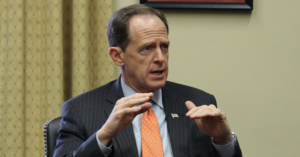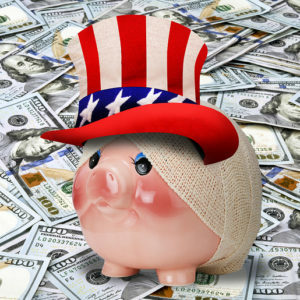A conservative think tank has released an economic analysis predicting President Joe Biden’s $3.5 trillion Build Back Better plan would hit Pennsylvanians right in the pocketbook — and the paycheck.
The proposal, at the center of the budget battle in D.C., would cost Keystone State taxpayers a $176 billion increase in their share of the national debt and kill 208,000 jobs in the state over the next 10 years, says Vance Ginn of the Texas Public Policy Foundation.
Ginn is the chief economist at the Texas Public Policy Foundation and a former associate director of the Office of Management & Budget in the Trump administration.
“Overall, we’re talking about $4.5 trillion in national debt, and that’s above the baseline that was already growing,” Ginn told Delaware Valley Journal. It would also mean “5.3 million jobs lost across the country and $3.7 trillion lost in economic output,” he added.
“These are huge tax increases. And the amount of dependency that will be basically forced upon Americans through expansion of these transfer payments, welfare programs, within the Build Back Better plan…would mean people are less prosperous, and that’s even in inflation-adjusted terms. This is massive.”

Photo courtesy Sen. Pat Toomey’s office
Sen. Pat Toomey (R-Pa.) also opposes the plan, and not just because of its price tag.
“It’s meant to make the middle class more dependent on government,” Toomey said in a statement to DVJournal. “The Democrats want to socialize this. This is a transformation of American society and the traditional relationship between the American people and government. This isn’t about how do you deal with people who are in abject poverty, how do you deal with people who are temporarily just unable to work. It has nothing to do with that. It’s about prosperous middle-class Americans becoming dependent on government and separating the link between government checks and any kind of responsibility to work.”
Toomey also dismissed claims by Biden and House Speaker Nancy Pelosi (D-Calif.) that the price tag for their proposal is “zero.”
“This is a very bad idea. I wouldn’t be for it if the money were free. The money is not free. This is a disaster,” Toomey said.
Democrats, on the other hand, believe the trillions in new social spending are vital for the country and the commonwealth.
“Nearly three million women left the workforce during the pandemic and full-time child care can cost more than in-state college tuition. Universal Pre-K and paid family leave will save money for families and raise wages for childcare workers,” U.S. Rep. Madeleine Dean (D-Montgomery) said on Facebook. “The pandemic has put a strain on families — the Build Back Better plan can help.”
U.S. Rep. Chrissy Houlahan (D-Chester) touted her “key initiative” that is now part of the Build Back Better Act. It would invest $9.5 billion to establish a subprogram within the Small Business Investment Company (SBIC) program to provide long-term capital to underserved markets and small manufacturers, according to her website.
“Not only must we help our small businesses recover but we must do so in a way that reflects the diversity of our investment community,” Houlahan said.
But Ginn argues the bill would be a huge setback for people and businesses that are just beginning to recover from the pandemic.
“It will decrease the amount of prosperity that Americans would have and that’s really troublesome,” said Ginn.“This is a massive redistribution tax hike. It’s a big government, socialist sort of approach that ends up being bad for Americans.”
Some of the tax increases included in Build Back Better hit small business owners and family farmers, who will be less able to pass on those businesses when they die.
“Dollars will be transferred from the productive part of our economy to those who aren’t working,” said Ginn.
He also believes will discourage people from investing in American industries and send investment and jobs overseas
“The corporate tax rate going from 21 percent, which is average in the developed world to 26.5 percent, it really puts the U.S. closer to 31 percent with state and local taxes,” he said. “So we’re talking about a substantial increase in the corporate tax. It means less investment, less capital accumulation and therefore fewer businesses that are going to want to move to the United States.”
“I mean, there’s just one tax hike after another that is going to reduce the entrepreneurial spirit,” said Ginn. Build Back Better would raise the cost of doing business, he added.
And all the trillions of dollars that were repatriated under the Trump tax plan, “we would drive more of that to other places. This would be a big boon to China, really,” Ginn said.
“It’s taking us down the road to serfdom,” said Ginn.

